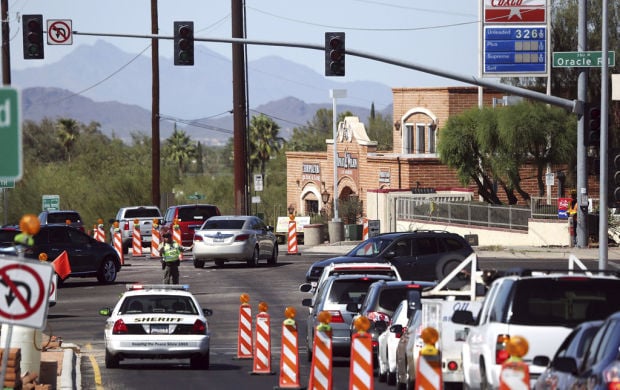A proposed Pima County law would make it illegal for anyone to stand in medians or on street corners to sell something or beg for money, and bans motorists from interactions with anyone doing so.
“The ordinance is being proposed because of the safety of people being in the medians,” Supervisor Ally Miller said.
Under the proposed law, it would be illegal to “occupy a county roadway or median for the purpose of soliciting, or attempting to solicit, employment, business, contributions, donations or sales from an occupant of a vehicle.”
A violation of the proposed law could land someone in jail for 30 days and face a $500 fine.
Miller said the law is needed to protect pedestrians and motorists by making it illegal to create an obstruction in a roadway.
“That’s why I’m doing this; it’s because of the safety issue,” she said.
She also said there have been increasing numbers of incidents of the homeless harassing people near intersections and in retail centers, and walking onto roadways to accept donations from motorists.
In her own experience, Miller said she recently nearly ran over a homeless man when he walked into a busy roadway.
“He was going into traffic to grab whatever the person was handing him,” Miller said.
Pima County Sheriff’s Department Chief Deputy Chris Nanos said his deputies began working on the issue with Miller earlier this year.
He said Miller told him of numerous instances of homeless people causing problems in the medians, committing robberies and harassing people in her north-west-side district.
“What we learned was that none of the incidents she spoke of were ever reported to us,” Nanos said.
Deputies did make contact with some of the alleged victims, however, and encouraged them to report any future incidents.
At the same time, Nanos said, deputies started to increase their enforcement efforts in the department’s Foothills District, which covers Miller’s district and portions of others.
The result, he said, was more deputy contact with the homeless.
“Naturally, the numbers are going to elevate, because that’s what we were looking for,” Nanos said.
But he said very few of the incidents deputies reported could be tied to homeless people or anyone else causing traffic obstructions, noting local and state laws are already in place to prevent roadway obstructions.
Countywide, from Feb. 20 to March 25, sheriff’s deputies reported six incidents of traffic hazards related to homeless people. Three of those incidents occurred at the intersection of Ina Road and La Cholla Boulevard.
During the same time, deputies reported to 93 total homeless-related calls and made 23 arrests.
The largest number of calls, 20 in all, were for suspicious activity.
Phoenix-based attorney Dan Barr said the county could face First Amendment challenges if the proposed ordinance passes.
“The clear focus of it is on expressive activity,” Barr said.
He said governments can generally regulate the time and place where speech occurs, but attempts to regulate the content of speech could be challenged.
For instance, many communities have attempted to regulate “aggressive” panhandling for safety concerns.
Communities also regulate signs to make sure they don’t block the road or create other hazards.
“The focus can’t be on the messaging but can be on the safety issues,” Barr said. But other communities have successfully kicked people off of medians, including the city of Tucson, which passed an ordinance similar to Pima County’s proposal in 2000.
That law reads, in part: “No person shall stand upon or otherwise occupy a street or highway and solicit or attempt to solicit employment, business, contributions, donations or sales of any kind from the occupant of any vehicle.”
Tucson City Attorney Mike Rankin said an early challenge to the rule failed in federal court.
“It’s content-neutral because it doesn’t regulate any particular kind of speech,” Rankin said.
The city’s law can be interpreted as a time and place limitation on speech rather than a prohibition against content, he said.
Similar to the county proposal, city officials said the law was needed as a safety measure.
The Arizona Daily Star opposed the law at the time because it eliminated street corner and median newspaper sales with the city limits.
The law came on the heels of several accidents involving commercial activity in medians.
Miller said the proposed county rule would similarly ban sales of any items from street corners and medians.
“It is meant to do that because it’s a serious safety issue,” Miller said, adding, “It’s not about putting people out of work.”
Supervisors plan to discuss the proposal at Tuesday’s meeting.





